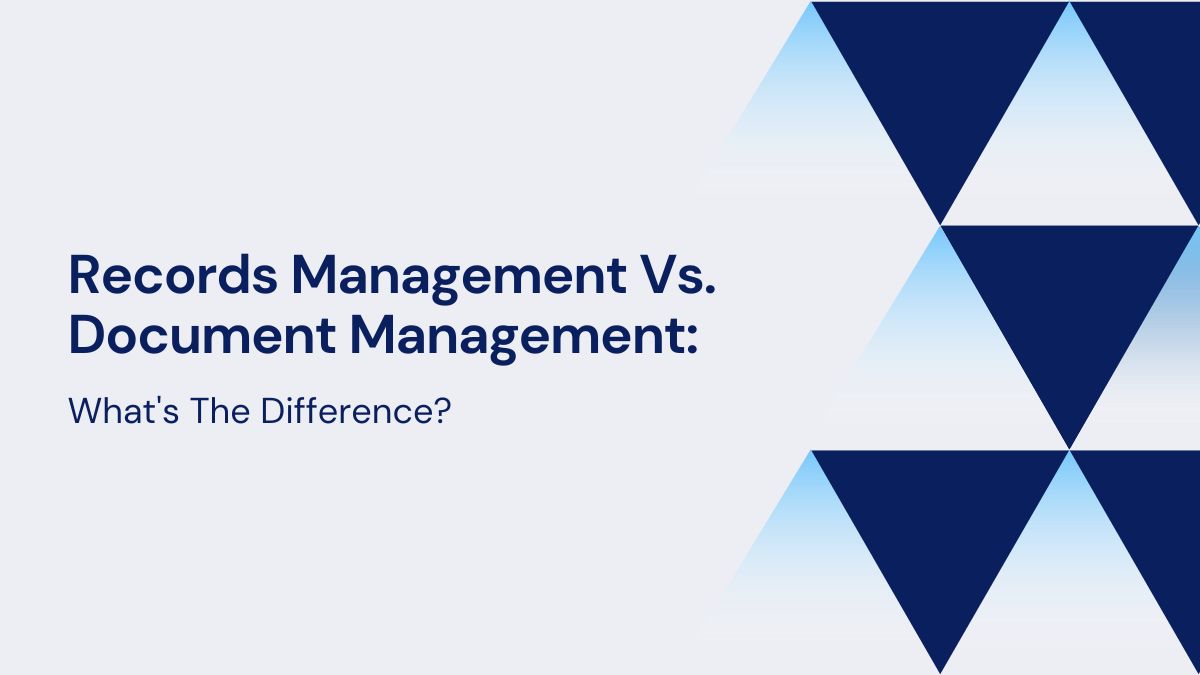
In our digital age, running a business means dealing with a lot of documents and records. But what’s the difference between document and records management? Grasping this difference is key to keeping your company’s data tidy and secure.
Think of all the written items your business creates—emails, contracts, reports. How do you keep them all organized, safe, and easy to find? And how do you decide what to keep and what to throw out?
Whether you’re a business veteran or just starting out, understanding document and records management can give you an edge. Let’s explore these crucial processes, pinpoint their differences, and see why they matter.
Understanding Document Management
Document management involves handling your business’s documents in a way that makes them easy to create, retrieve, and store. Essentially, it’s about ensuring everyone in your business can find what they need when they need it.
Let’s take a closer look at the key roles of document management.
- Creation: This involves producing documents such as invoices, memos, or emails. A good document management system makes creating these types of documents efficient and consistent.
- Storage: Once a document is created, it needs a safe and secure home. This could be in a digital format (like in cloud storage) or physical format (like in a filing cabinet).
- Retrieval: This involves being able to find and access documents quickly and easily. A solid document management system has a reliable search function to assist in this process.
- Disposal: Once a document is no longer needed, it must be disposed of properly to maintain the organization and security of your document management system.
Efficient document management can work wonders for business operations. But what happens when the document in question holds long-term value or legal weight?

Defining Records Management
Records management is the process of identifying, categorizing, archiving, and eventually destroying records. A tool often utilized for these processes is records management software.
Records are a subset of documents—they’re the ones that provide evidence of your business’s activities. They can be as mundane as an email exchange about holiday leave or as crucial as a contract with a key supplier.
Here’s what records management typically includes:
- Identification: This is about recognizing what constitutes a record. Not every document is a record, so being able to tell the difference is important.
- Protection: Once a document is identified as a record, it needs to be kept safe and secure. This involves both physical protection from things like theft or damage, as well as digital protection from things like data breaches.
- Retrieval: Similar to document management, retrieval involves being able to locate and access records when needed. However, because records can have legal implications, retrieval might involve more restrictions and controls.
- Lawful Disposal: Disposing of records must be done according to certain laws and regulations. It’s not always as simple as hitting the delete button or throwing something in the trash.
Understanding these processes can help in organizing your company’s data effectively. Now, let’s put document management and records management side by side and see what sets them apart.
Comparing And Contrasting Document And Records Management
While both document and records management are crucial for any business, they serve different purposes. Think of document management as the daily routine, keeping things neat and tidy on an ongoing basis. On the other hand, records management is like a secure vault, preserving essential items for the long haul.
However, these processes are not entirely distinct. In fact, they often overlap. For instance, a contract might be created and stored using document management processes but then archived and protected as part of records management when it becomes legally binding. Thus, the same document could transition from one process to another.
Yet, the primary difference lies in their purpose. Document management focuses on the efficient handling of all documents, while records management is geared towards the lawful retention and disposal of documents with lasting significance.

The Role Of Software In Document And Records Management
In our tech-driven world, software plays a crucial role in both document and records management. It takes the manual labor out of organizing, retrieving, and storing documents or records. Plus, it adds a layer of security and compliance that’s hard to achieve with traditional, paper-based systems.
For document management, software solutions can provide digital storage, easy collaboration, and robust search functionality. On the other hand, records management often requires more specialized software designed to handle the complexity of legal retention requirements and secure archiving.
No matter the size or scope of your business, software can help streamline your document and records management processes. It’s like having a dedicated personal assistant for your data—one that never sleeps and always stays organized.
Conclusion
Understanding the difference between document and records management is more than sorting files—it’s a strategic part of running a successful business. These processes keep your data organized, compliant, and secure, all of which contribute to smoother business operations.
In the evolving digital landscape, adapting these management systems is a smart move. It not only simplifies your daily work but also safeguards your business’s valuable information. With these practices in place, your business is well-equipped to thrive in the dynamic world of data.




